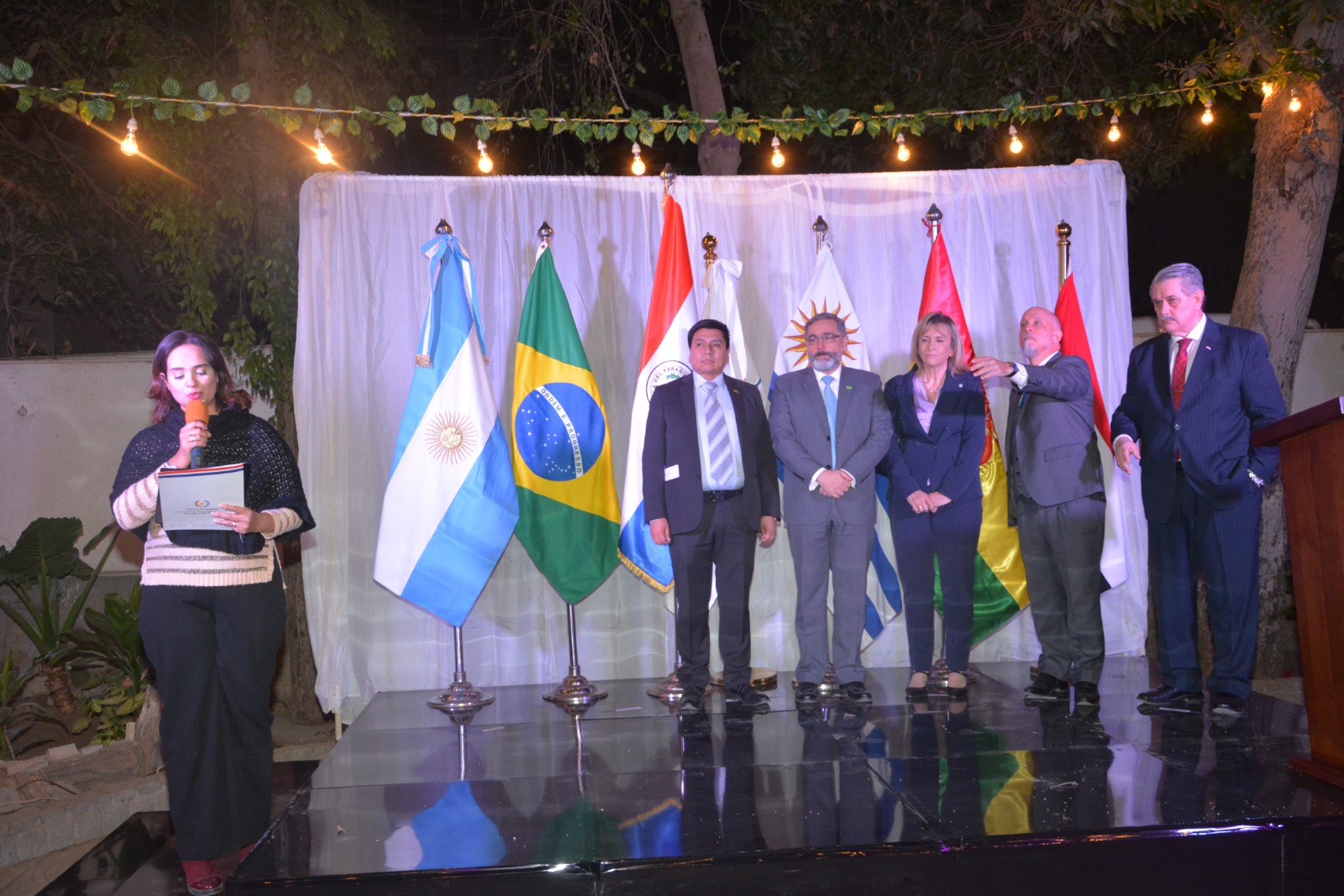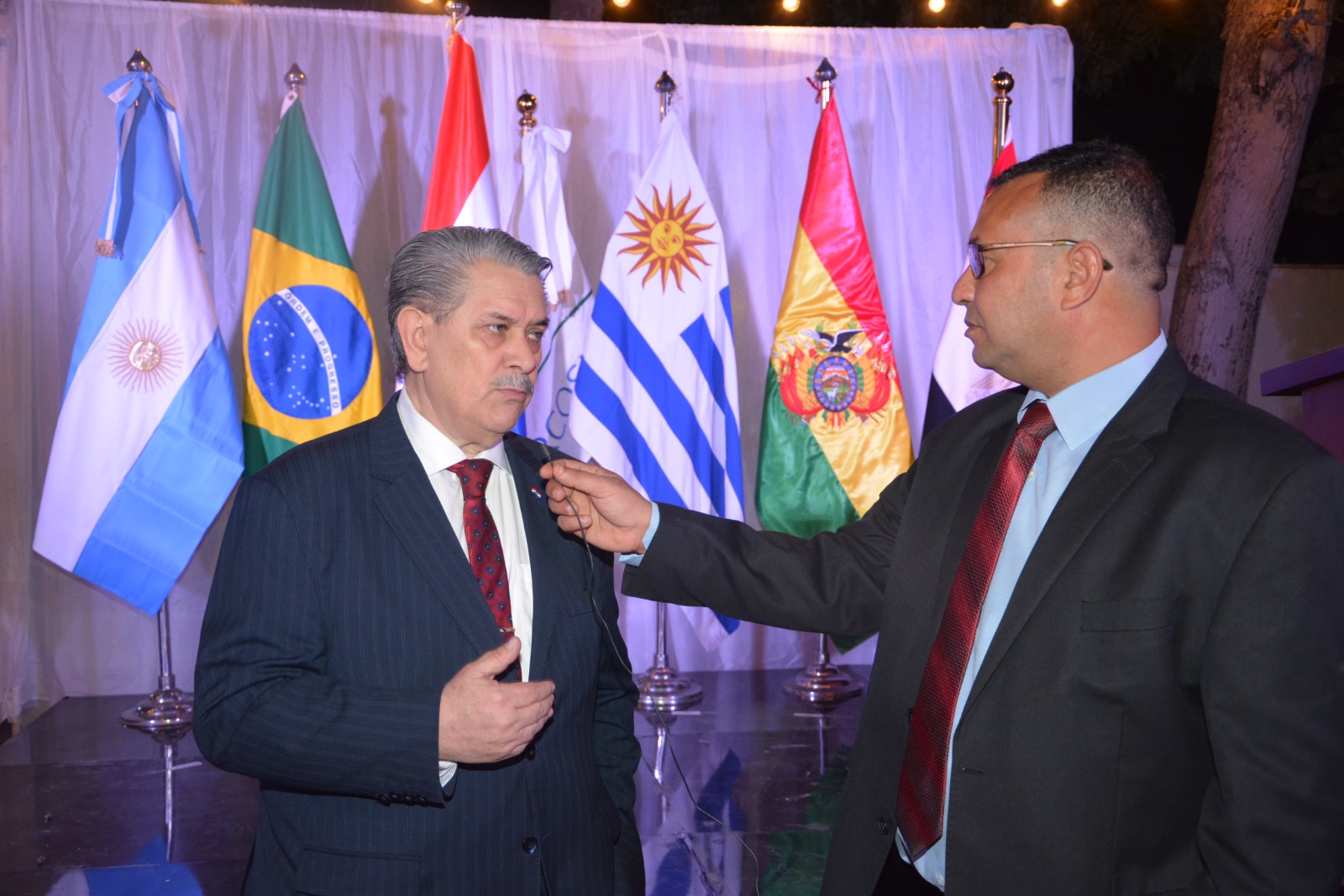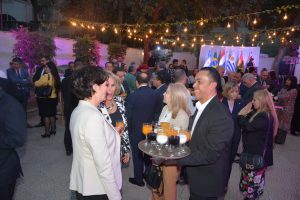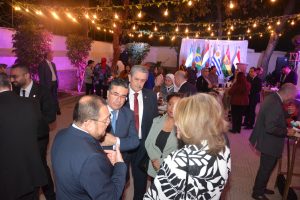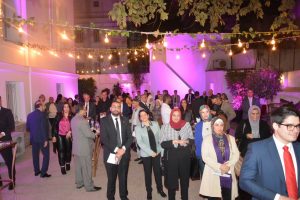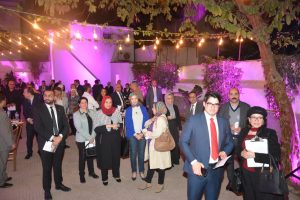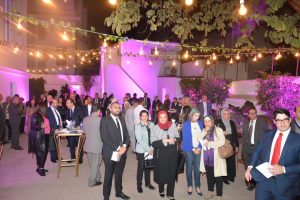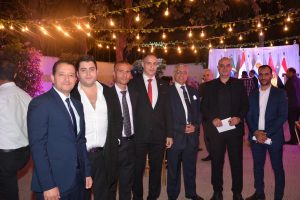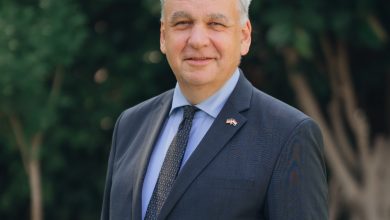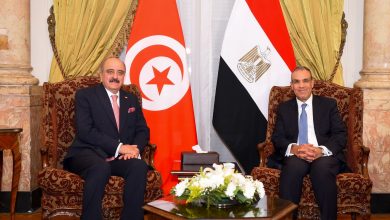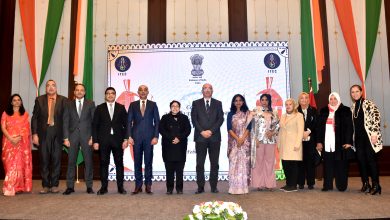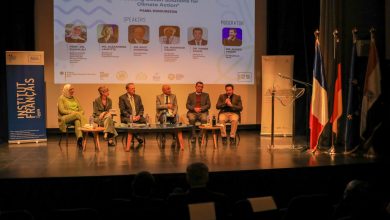On the occasion of the 33rd Anniversary of the MERCOSUR
Remarks by Ambassador Víctor Hugo Peña Bareiro,
Embassy of Paraguay, on behalf of MERCOSUR’s Pro Tempore Presidency
March 26, 2024
High Authorities of the Arab Republic of Egypt,
Mr. and Ms. Ambassadors, Head of Missions and Diplomatic Corps,
Ladies and Gentlemen,
Paraguay is exercising the Pro Tempore Presidency of MERCOSUR in the current semester and although we could have celebrated this important occasion in our Embassy in Maadi, we are considering that it is Ramadan and, trying to facilitate mobility for the majority of our guests, we opted to accept the kind offer of our friend, Argentinian Ambassador Gonzalo Urriolabeitia, for this significant commemoration. Thank you, dear Gonzalo and, through you, to all the team of the Argentinian Embassy. Thank you very much, dear friends, for your presence today.
MERCOSUR began with the anticipated vision of Presidents Raúl Alfonsín and José Sarney who promoted and signed the Yguazú Act, on November 29, 1985, as an Agreement between Argentina and Brazil which laid the foundations for what would later be MERCOSUR. Shortly after Paraguay recovered its democracy in February 1989, negotiations began for the Treaty of Asunción, name given to the Constitutive Instrument of the Southern Common Market (MERCOSUR). It was signed on March 26, 1991, 33 years ago today, in the capital city of Paraguay. The signatories were: Carlos Saúl Menem (Argentina), José Sarney (Brazil), Andrés Rodríguez (Paraguay) and Julio María Sanguinetti (Uruguay).
Since then, we, the founding countries, have made great progress together. Intra-zone trade has grown exponentially; trade and investment opportunities have expanded and they continue to expand, all within the framework of the competitive integration of national economies in the international market. A Common External Tariff has been established, as well as a Common Trade Policy has been adopted towards other countries or multilateral organizations and Macroeconomic and Sectoral Policies are coordinated between the State Members of the bloc.
Although, not only the economic-commercial area has advanced in MERCOSUR. Cooperation agreements have also been reached in matters such as: human rights, immigration, environment, culture, science, security, among others.
MERCOSUR is the second largest open labor market in the world, surpassed only by the European Union. Citizens of the Party States and even the Associated States are citizens of MERCOSUR and can obtain, through facilitated procedures, their legal residence in any of the State Members and with said proof, they can reside, work and study in any of them. Under the Consular Cooperation Mechanism, nationals of the States Parties who are in a city or region or country of the world where there is no Diplomatic or Consular Representation provided by their own country, will be protected and assisted by the Diplomatic and Consular Representations of the other States Parties. Furthermore, the Driving License issued in one State Party is valid in the others.
MERCOSUR has been of great attraction in the commercial, political, cultural and social fields from the very beginning of its existence. The four founding States were soon joined by all the other South American countries as Associated States. As a bloc, it has received proposals to sign Trade Agreements with different countries or with groups of countries. Some of these Treaties are already in force, others are still being processed and new proposals to the previous ones are being expressed.
The first of the Free Trade Agreement between MERCOSUR and a country outside the region was the one concluded with EGYPT. It was signed in 2010 and has been fully in force since 2017. Commercial exchange between both partners has increased very strongly but, logically, we all wish that this exchange gets incremented even more to reach its full potential. In recent years, this exchange has reached US$3.929 billion.
We encourage companies and entrepreneurs in Egypt to look with much greater interest at the MERCOSUR countries and increase their exports to these destinations. Our countries want to increment bilateral trade in both directions. Commercial exchange between our regions will undoubtedly be a lever for shared prosperity between Egypt and MERCOSUR.
MERCOSUR has accompanied the challenging economic times that Egypt has gone through, exacerbated by COVID-19 and the war in Ukraine, which has generated a crisis for the import of wheat and other foods, vital to guarantee food security to the Egyptian population. Our countries have offered –with genuine solidarity– to share their experiences and knowledge that help strengthen the goal that “all Egyptians and those who live in Egypt have permanent physical, social and economic access to safe, nutritious food in sufficient quantities to cover their nutritional requirements.”
The MERCOSUR countries, the four founders, are world leaders in the application of the DIRECT SOWING technique, whose multiple benefits include the reduction of: soil erosion, water evaporation, the use of fossil fuels and greenhouse gases. It improves chemical fertility; increase nutrient cycling, it reduces operating costs, etc. It also increases the accumulation of stubble or aerial biomass of annual crops due to the contribution of organic matter to the soil; it sequesters carbon and provides cover to reduce water and wind erosion or can be used for livestock grazing. Direct sowing is essential for varieties such as soybeans, corn, wheat, sunflower, sorghum, among many other seeds.
For its part, Egypt is a key country in the region and in the world. And it is particularly important for the MERCOSUR countries that have had their first trading partner in it.
MERCOSUR expanded in 2013 to include Venezuela, whose membership is today characterized with a special status.
Since December 2023, we are celebrating the great news that Bolivia has concluded the processes in the Executive Power for its incorporation as a full member of MERCOSUR. We are currently awaiting the parliamentary ratification in the Bolivian Legislative Power and then four years to adapt its regulations to the complete plexus of MERCOSUR.
The addition of Bolivia to MERCOSUR, which the Presidents of the bloc are already considering as a “Full Member”, empowers the said bloc in terms of energy and mineral resources, especially the very strategic and sought-after Lithium, essential to power batteries of all types, including the ones for vehicles, electronics, ICT devices, among others.
Bolivia is also a founding member of the Andean Community of Nations (CAN) and as such, it will strengthen the already excellent links that MERCOSUR and CAN countries have as a bloc and in individual terms.
Bolivia, a land-locked country like Paraguay, will be able to access the Atlantic Ocean through the Paraná – Paraguay Waterway, which currently transports 50 million tons of food produced by the MERCOSUR countries. This tonnage must grow much more. The Paraguay – Paraná Waterway is home to the third largest fleet of river barges in the world, only surpassed by the Mississippi river in the United States and the Yangtse river in China.
In short, MERCOSUR, as a bloc, is a world power regarding:
- Possessing a great water wealth contained in its rivers, streams, lakes.
- The Guarani aquifer, which is the 4th largest freshwater reservoir in the world.
- Conventional and shale oil and gas reserves.
- Gold, silver, copper, tin and large reserves of critical minerals for the new economy: lithium, nickel, graphite, silicon, rare-earth elements, high-grade iron ore, etc.
- Own satellites and nuclear technology.
- Cutting-edge technology in the automotive and aeronautical industry.
- Direct sowing for agriculture.
- Great production of quality food and the capacity to increase it significantly.
- The best meats in the world.
The Free Trade Agreement between MERCOSUR and Singapore was also signed last December in Rio de Janeiro, Brazil in the Executive Power. It is the bloc’s first Agreement with an Association of Southeast Asian Nations (ASEAN) country member. In this way, MERCOSUR exports to ASEAN will be able to have Singapore as their gateway to the region, given its strategic location and its status as a powerful logistical and financial hub in the region.
Singapore is positioned as one of the largest investors and recipients of investments in the world, in addition to being one of the largest providers of maritime transport services. It has a GDP per capita of US$60,000 and is a main food importer, which, precisely, is what all MERCOSUR countries produce. The FTA will allow trade flows to expand and will provide greater predictability through modern disciplines and better conditions for the establishment of investments.
Singapore is a respected global investor in various economic sectors. Its Sovereign Funds are among the top ten in the world. Statistics record that, in 2020, the country’s investments in Latin American and the Caribbean (LAC) countries have been US$127 billion. MERCOSUR’s exports to Singapore have been, in 2021, US$7 billion, with poultry products, ferroalloys, beef and pork; and iron ores. It is certain that these figures and variety of trade products will multiply with the validity of the Agreement.
We are currently waiting for the constitutional mechanisms of the MERCOSUR State members and of Singapore to give their respective habitual congressional ratifications.
MERCOSUR and the nations of the European Free Trade Association (EFTA) have also managed to substantially conclude negotiations for a comprehensive Free Trade Agreement. The States Parties of MERCOSUR have decided to give a strong boost to the negotiations between both blocs so that companies from both Parties benefit from privileged access to their respective markets for millions of consumers. The current trade exchange is already significant, but it is expected that trade in goods and services, investments, competitiveness and sustainable development, among others, will be emphatically strengthened when the FTA is concluded, signed and in force.
In recent days, Paraguayan Foreign Minister Ramírez Lezcano, on behalf of the Pro Tempore Presidency of MERCOSUR, announced the beginning of negotiations for the signing of a Free Trade Agreement with JAPAN, the 4th world economy and a global scientific and technological leader, with special emphasis on the preservation of the environment.
Finally, we mention as a main objective, the signing of the Free Trade Agreement between MERCOSUR and the European Union.
Both blocs are engaged in constructive discussions with a view to concluding the pending issues in the Association Agreement.
The Parties hope to quickly reach an agreement that corresponds to the strategic nature of the ties that link both blocs and the crucial contribution they can offer to address global challenges in areas such as sustainable development, the reduction of inequality and multilateralism.
However, regarding the above, some sectors of certain countries have believed that, as it stands, the Agreement would be harmful to the environment, not only for the agricultural but also for the industrial sectors.
Let us remember that, within MERCOSUR we have incomparable water wealth; in addition to abundant fresh water (according to FAO, one third of the world’s freshwater reserves are concentrated in Latin America and a good part of it within MERCOSUR); diverse biomes and forests, immense potential for bioeconomy, available fertile lands, lots of biomass and unparalleled potential to participate and expand the carbon market. We are in a position to significantly increase agricultural production, and in the same time, to advance in the fields of sustainable and regenerative technologies, recovering degraded lands and employing other environmentally friendly techniques.
MERCOSUR is a world leader in direct sowing practices, with all the benefits that this technique brings to the environment. It is also applicable to biofuel technologies, production and business models that, very soon, will be a magnet for industrial investment allocation.
MERCOSUR has two countries whose energy generation matrix is 100% green and other of its members has it as 85% green; which are much higher than the 39% average in the developed world.
At the time of the great global objective of decarbonizing, MERCOSUR has the unmatched potential to produce green hydrogen, according to global standards and at highly competitive prices. This is due to its richness in clean energy and abundance of freshwater.
For all these reasons, MERCOSUR is very attractive for “powershoring”, a business strategy that locates production centers close to the availability of green, clean and affordable energy. Powershoring is already attracting major investments for electro-intensive industries, cement, steel, paper and pulp, fertilizers, glass, ceramics, chemicals, petrochemicals and many other industrial sectors that need to apply a decarbonization policy, protect business competitiveness and comply with European regulations.
MERCOSUR can, through powershoring and green hydrogen, accelerate the decarbonization of European value chains, also reducing deadlines and costs of decarbonizing its electrical matrix.
In the last decade, 75% of direct external investment in solar and wind energy in Latin America –most of it in MERCOSUR– has come from the European Union. In this field, the EU Global Gateway, through strategic investment planning, has opted for the signing of strategic environmental partnerships, which include green hydrogen, and has signed bilateral agreements to produce green hydrogen with MERCOSUR countries.
Without a doubt, the Agreement between MERCOSUR and the European Union has obstacles to overcome. It has been because of them that, despite the fact that in both blocs there are strategic actors genuinely interested in the signing of the FTA, some other interests have not been in tune with the constructive purposes of the majorities in both blocs.
It is essential to perceive the ‘on-hold’ Agreement as a genuinely cooperative action in which both blocs will seek to make important contributions to global challenges in areas such as sustainable development, inequality reduction and multilateralism.
Once in force, the Agreement could add 25% of global GDP; 37% of world exports of goods and services; start with a 91% tax reduction; involve 10% of the world’s population directly and it could mobilize 29% of global flows of Foreign Direct Investment and 34% of the global stock thereof.
The signing of the Free Trade Agreement between MERCOSUR and the EUROPEAN UNION will be able to demonstrate the benefits of being linked to broad and ambitious initiatives, considering the benefits and gains, both for the European Union, MERCOSUR and the entire world.
In the holy month of the Muslim faith: RAMADAN KARIM, and also a blessed GREAT LENT and HOLY WEEK for the Christian faith.
